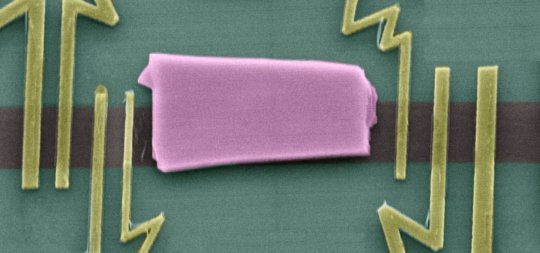[ad_1]
Graphene Flagship researchers have shown in a paper published in Science Advances how heterostructures built from graphene and topological insulators have strong, proximity induced spin-orbit coupling which can form the basis of novel information processing technologies.
Spin-orbit coupling is at the heart of spintronics. Graphene’s spin-orbit coupling and high electron mobility make it appealing for long spin coherence length at room temperature. Graphene Flagship researchers from Chalmers University of Technology (Sweden), Catalan Institute of Nanoscience and Nanotechnology — ICN2 (Spain), Universitat Autònoma de Barcelona (Spain) and ICREA Institució Catalana de Recerca i Estudis Avançats (Spain) showed a strong tunability and suppression of the spin signal and spin lifetime in heterostructures formed by graphene and topological insulators. This can lead to new graphene spintronic applications, ranging from novel circuits to new non-volatile memories and information processing technologies.
“The advantage of using heterostructures built from two Dirac materials is that, graphene in proximity with topological insulators still supports spin transport, and concurrently acquires a strong spin-orbit coupling,” said Associate Professor Saroj Prasad Dash, from Chalmers University of Technology.
“We do not just want to transport spin we want to manipulate it,” said Professor Stephan Roche from ICN2 and deputy leader of the Graphene Flagship’s spintronics Work-Package, “the use of topological insulators is a new dimension for spintronics, they have a surface state similar to graphene and can combine to create new hybrid states and new spin features. By combining graphene in this way we can use the tuneable density of states to switch on/off — to conduct or not conduct spin. This opens an active spin device playground.”
The Graphene Flagship, from its very beginning, saw the potential of spintronics devices made from graphene and related materials. This paper shows how combining graphene with other materials to make heterostructures opens new possibilities and potential applications.
“This paper combines experiment and theory and this collaboration is one of the strengths of the Spintronics Work-Package within the Graphene Flagship,” said Roche.
“Topological insulators belong to a class of material that generate strong spin currents, of direct relevance for spintronic applications such as spin-orbit torque memories. As reported by this article, the further combination of topological insulators with two-dimensional materials like graphene is ideal for enabling the propagation of spin information with extremely low power over long distances, as well as for exploiting complementary functionalities, key to further design and fabricate spin-logic architectures,” said Kevin Garello from IMEC, Belgium who is leader of the Graphene Flagships Spintronics Work-Package.
Professor Andrea C. Ferrari, Science and Technology Officer of the Graphene Flagship, and Chair of its Management Panel added “This paper brings us closer to building useful spintronic devices. The innovation and technology roadmap of the graphene Flagship recognises the potential of graphene and related materials in this area. This work yet again places the Flagship at the forefront of this field, initiated with pioneering contributions of European researchers.”
Story Source:
Materials provided by Graphene Flagship. Note: Content may be edited for style and length.
[ad_2]















